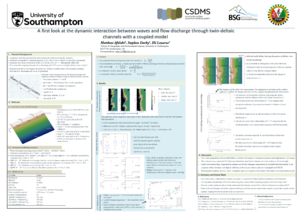2023 CSDMS meeting-038: Difference between revisions
From CSDMS
Adeemath007 (talk | contribs) No edit summary |
No edit summary |
||
| Line 29: | Line 29: | ||
{{CSDMS meeting abstract template 2023 | {{CSDMS meeting abstract template 2023 | ||
|CSDMS meeting abstract=For a subset of global deltas, morphological evolution is due to the competing actions of the river, which brings about the delivery of terrestrial sediment, and waves, which redistribute the input sediment across the coastline. Given that there are many such coastlines where waves exert considerable influence worldwide, an improved understanding of the effect of waves on the morphological evolution of coastal delta settings is imperative, especially in view of the perceived declining influence of the river input. Accordingly, this study presents a preliminary numerical model approach applied to investigate the planform evolution of deltaic coastlines due to the interplay between flow discharge and waves. Model simulations were undertaken with the coupled Delft3D and SWAN (Simulating Waves Nearshore) numerical models for fluvial and wave input, respectively. Additionally, the idealized numerical model represents a straight, sandy deltaic coastline interrupted by two fluvial discharge outlets, and, at the same time, affected by waves approaching from a dominant direction. We found that the modelled deltas evolved into diverse shoreline - and - river–mouth forms under varying combinations of wave and river inputs. The modelling approach also makes a preliminary distinction between the relative effects of waves’ significant height (Hs) and incidence angle (αo) on deltaic planform morphological evolution. Future development of the model will focus on critically exploring the interaction between these two key morphodynamic processes along similar natural coastline settings. | |CSDMS meeting abstract=For a subset of global deltas, morphological evolution is due to the competing actions of the river, which brings about the delivery of terrestrial sediment, and waves, which redistribute the input sediment across the coastline. Given that there are many such coastlines where waves exert considerable influence worldwide, an improved understanding of the effect of waves on the morphological evolution of coastal delta settings is imperative, especially in view of the perceived declining influence of the river input. Accordingly, this study presents a preliminary numerical model approach applied to investigate the planform evolution of deltaic coastlines due to the interplay between flow discharge and waves. Model simulations were undertaken with the coupled Delft3D and SWAN (Simulating Waves Nearshore) numerical models for fluvial and wave input, respectively. Additionally, the idealized numerical model represents a straight, sandy deltaic coastline interrupted by two fluvial discharge outlets, and, at the same time, affected by waves approaching from a dominant direction. We found that the modelled deltas evolved into diverse shoreline - and - river–mouth forms under varying combinations of wave and river inputs. The modelling approach also makes a preliminary distinction between the relative effects of waves’ significant height (Hs) and incidence angle (αo) on deltaic planform morphological evolution. Future development of the model will focus on critically exploring the interaction between these two key morphodynamic processes along similar natural coastline settings. | ||
|CSDMS meeting posterPDF= CSDMS_023_MAfolabi.pdf | |||
|CSDMS meeting posterPNG= CSDMS_023_MAfolabi.png | |||
|CSDMS meeting | |||
}} | }} | ||
{{blank line template}} | {{blank line template}} | ||
Latest revision as of 16:21, 25 May 2023
(if you haven't already)
Log in (or create account for non-CSDMS members)
Forgot username? Search or email:CSDMSweb@colorado.edu
Browse abstracts
A first look at the dynamic interaction between waves and flow discharge through twin-deltaic channels with a coupled model
Matthew Afolabi,
University of Southampton Southampton , United Kingdom. mra1u19@soton.ac.uk
For a subset of global deltas, morphological evolution is due to the competing actions of the river, which brings about the delivery of terrestrial sediment, and waves, which redistribute the input sediment across the coastline. Given that there are many such coastlines where waves exert considerable influence worldwide, an improved understanding of the effect of waves on the morphological evolution of coastal delta settings is imperative, especially in view of the perceived declining influence of the river input. Accordingly, this study presents a preliminary numerical model approach applied to investigate the planform evolution of deltaic coastlines due to the interplay between flow discharge and waves. Model simulations were undertaken with the coupled Delft3D and SWAN (Simulating Waves Nearshore) numerical models for fluvial and wave input, respectively. Additionally, the idealized numerical model represents a straight, sandy deltaic coastline interrupted by two fluvial discharge outlets, and, at the same time, affected by waves approaching from a dominant direction. We found that the modelled deltas evolved into diverse shoreline - and - river–mouth forms under varying combinations of wave and river inputs. The modelling approach also makes a preliminary distinction between the relative effects of waves’ significant height (Hs) and incidence angle (αo) on deltaic planform morphological evolution. Future development of the model will focus on critically exploring the interaction between these two key morphodynamic processes along similar natural coastline settings.

